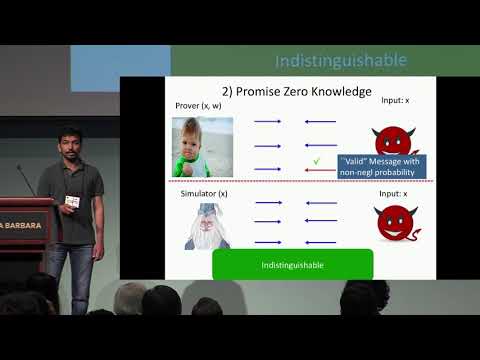Welcome to the resource topic for 2017/1088
Title:
Promise Zero Knowledge and its Applications to Round Optimal MPC
Authors: Saikrishna Badrinarayanan, Vipul Goyal, Abhishek Jain, Yael Tauman Kalai, Dakshita Khurana, Amit Sahai
Abstract:We devise a new partitioned simulation technique for MPC where the simulator uses different strategies for simulating the view of aborting adversaries and non-aborting adversaries. The protagonist of this technique is a new notion of promise zero knowledge (ZK) where the ZK property only holds against non-aborting verifiers. We show how to realize promise ZK in three rounds in the simultaneous-message model assuming polynomially hard DDH (or QR or N^{th}-Residuosity). We demonstrate the following applications of our new technique: → We construct the first round-optimal (i.e., four round) MPC protocol for general functions based on polynomially hard DDH (or QR or N^{th}-Residuosity). → We further show how to overcome the four-round barrier for MPC by constructing a three-round protocol for list coin-tossing'' -- a slight relaxation of coin-tossing that suffices for most conceivable applications -- based on polynomially hard DDH (or QR or N^{th}-Residuosity). This result generalizes to randomized input-less functionalities. Previously, four round MPC protocols required sub-exponential-time hardness assumptions and no multi-party three-round protocols were known for any relaxed security notions with polynomial-time simulation against malicious adversaries. In order to base security on polynomial-time standard assumptions, we also rely upon a leveled rewinding security technique that can be viewed as a polynomial-time alternative to leveled complexity leveraging for achieving non-malleability’’ across different primitives.
ePrint: https://eprint.iacr.org/2017/1088
Talk: https://www.youtube.com/watch?v=UJgn_wtumKo
See all topics related to this paper.
Feel free to post resources that are related to this paper below.
Example resources include: implementations, explanation materials, talks, slides, links to previous discussions on other websites.
For more information, see the rules for Resource Topics .
